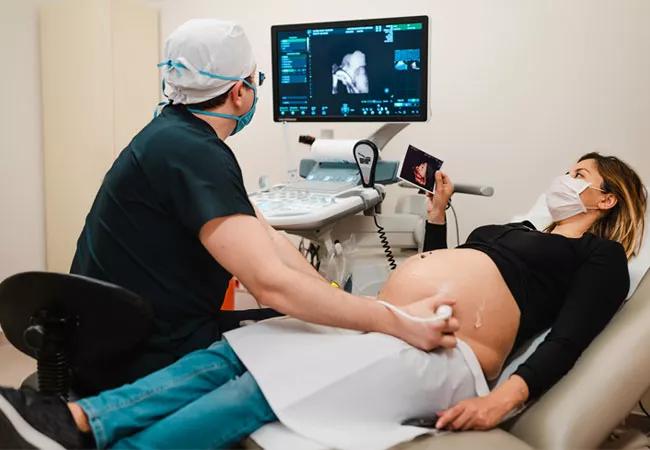What’s next for maternal-fetal medicine?

Image content: This image is available to view online.
View image online (https://assets.clevelandclinic.org/transform/62019956-8be1-4798-bf5b-3d529a934081/20-WHI-1965253-CQD-WHI-YIR_CQD_650x450_1239406102_jpg)
20-WHI-1965253 CQD WHI YIR_CQD_650x450_1239406102
In an ongoing effort to ensure that high-risk mothers and babies receive the best possible care, Cleveland Clinic’s Section of Maternal-Fetal Medicine will fall under the Department of Obstetrics and Gynecology by the end of the year.
Advertisement
Cleveland Clinic is a non-profit academic medical center. Advertising on our site helps support our mission. We do not endorse non-Cleveland Clinic products or services. Policy
“Whether we are dealing with a mother, an unborn baby or both who are at high risk due to a medical condition, this arrangement will enable us to better coordinate the care and services we provide before, during and after birth,” says Edward Chien, MD, MBA, who was appointed Chair of the Department of Obstetrics and Gynecology in December 2019.
The subspecialty of maternal-fetal medicine evolved from the need to provide special care for the growing number of women with medical complications of pregnancy, including those with fetal abnormalities. One consequence is that women born with congenital heart defects are now surviving into adulthood and want to have babies or become pregnant.
“Many still have issues that complicate their pregnancy or increase the risk of morbidity and mortality,” says Dr. Chien.
Maternal-fetal medicine specialists also provide care for pregnant women at increased risk due to medical conditions such as cystic fibrosis, cancer, hypertension, diabetes, Crohn’s disease, autoimmune diseases and seizure disorders, as well as those who are older or have a history of pregnancy complications.
More recently, Cleveland Clinic maternal-fetal medicine specialists assumed a unique role in helping women who have undergone uterine transplantation go through pregnancy and delivery.
The widespread use of ultrasound for prenatal screenings enables many fetal abnormalities to be diagnosed in utero. At Cleveland Clinic, maternal-fetal medicine specialists partner with obstetricians to care for babies with abnormalities that may involve the heart, digestive system or central nervous system.
Advertisement
Today, a number of fetal interventions are possible that can improve birth outcomes. “Specialists in our Fetal Surgery Program repair myelomeningocele and other significant issues. We then follow the mother through pregnancy and delivery,” says Dr. Chien.
A new addition to this program is a fetal laser specialist who treats twin-to-twin transfusion syndrome. This condition, in which twins share a blood supply across the placenta, carries a high mortality risk for one or both babies.
“The outcome is improved when the vessels are occluded to prevent the exchange of blood between the babies,” says Dr. Chien.
Cleveland Clinic obstetricians are available in 14 locations throughout Northeast Ohio. When it comes time to deliver, however, high-risk patients may be transferred to the Special Delivery Unit on the main campus, where they can be closely monitored by maternal-fetal medicine specialists. The unit is located adjacent to the cardiac catheterization lab and cardiac intensive care unit and is convenient to all pediatric and adults subspecialists.
In their dedication to improving the health of pregnant women and delivering healthy babies, the Department of Obstetrics & Gynecology has undertaken several research initiatives.
They are piloting the use of telehealth to monitor patients with hypertension during pregnancy and postpartum. In addition, they are collaborating with the Ohio Department of Health on a quality improvement project related to the management of patients with severe hypertension. Finally, Dr. Chien’s team is partnering with colleagues at University Hospitals of Cleveland and MetroHealth on a study of COVID-19 and pregnancy led by Cleveland Clinic obstetrician-gynecologist and Vice Chair for Clinical Research, Ruth Farrell, MD, MA. “We are hoping to identify the factors that might predict the risk of COVID-19 transmission to the fetus and their impact on maternal pregnancy outcomes,” he says.
Advertisement
Advertisement
Increasing uptake remains a challenge
Multidisciplinary teams work together in in-situ scenarios
Uterine transposition cleared the field for radiation therapy
ACOG-informed guidance considers mothers and babies
Prolapse surgery need not automatically mean hysterectomy
Artesunate ointment shows promise as a non-surgical alternative
New guidelines update recommendations
Two blood tests improve risk in assessment after ovarian ultrasound